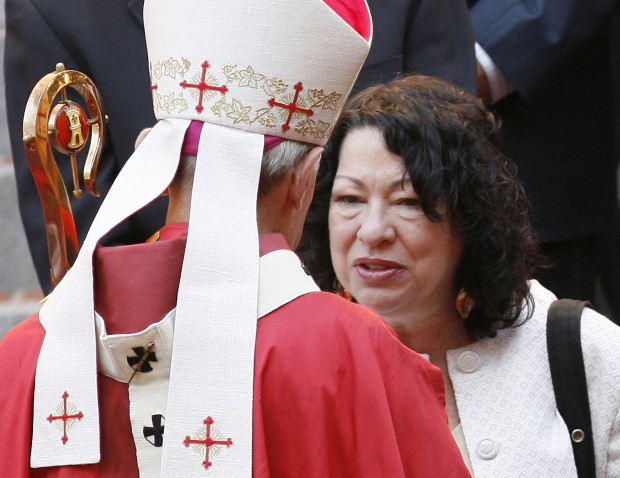
Supreme Court Justice Sonia Sotomayor talks with then-Archbishop Donald W. Wuerl of Washington following the 2009 annual Red Mass at the city’s Cathedral of St. Matthew the Apostle. (CNS photo/Nancy Wiechec)
WASHINGTON (CNS) — Supreme Court Justice Sonia Sotomayor denied two companies’ request for an injunction while they challenge part of the Department of Health and Human Services’ contraceptive mandate in court.
In an order filed Dec. 26, Sotomayor ruled that the owners of the Hobby Lobby craft store and the Mardel Christian bookstore chains did not qualify for an injunction while they challenge requirements of the Affordable Care Act. The law takes effect Jan. 1.
Four days later, a federal District Court judge in Michigan granted a temporary restraining order to Tom Monaghan, the founder of Domino’s Pizza, allowing him to decline to provide contraceptive coverage to the employees of his current business, Domino’s Farms Office Complex. The company’s website lists offices for lease, a petting farm, an art gallery, a hair salon, a fitness center, a Catholic chapel and Our Lady of Grace Bookstore among the entities on the property. It’s unclear how many people are employees of Domino’s Farms. Monaghan no longer has any financial interest in the pizza company.
District Court Judge Lawrence P. Zatkoff issued the Dec. 30 temporary restraining order, saying there would be little harm to the government in delaying possible implementation of the law at the company and that there was enough evidence of a possible valid religious rights claim by Domino Farms to justify further court proceedings.
At the Supreme Court, Sotomayor ruled on the bookstore chain’s petition because she oversees the federal circuit where Hobby Lobby filed suit challenging the HHS mandate.
The companies’ Oklahoma City-based owners contend that the mandate violates their religious beliefs because some of the drugs they are required to cover can lead to abortion. The family-owned companies have said they have no moral objection to “the use of preventive contraceptives” and will continue to cover those for employees.
The owners have appealed lower-court rulings that denied their claims on religious grounds.
Meanwhile, Priests for Life won its challenge to the mandate when government lawyers agreed Dec. 20 that the pro-life organization would not have to offer contraceptive services through the health insurance it provides to employees.
Charles S. LiMandri, president and chief counsel for the Freedom of Conscience Defense Fund, which filed Priests for Life’s lawsuit against the government, told Catholic News Service that the government changed its stance after a judge in the District Court for the Eastern District of New York said he would be inclined to side with the pro-life group. Priest for Life argued that it was a religious organization that should be exempt from the rule.
The American Freedom Law Center also filed the suit on behalf of Priests for Life.
Without the agreement, Priests for Life would have been forced to comply with the mandate beginning Jan. 1 or face fines for not complying, LiMandri said.
The agreement will stay in effect at least until the government issues new regulations covering contraceptive services under the health care law. The new regulations are expected in 2013.
Sotomayor’s decision does not pertain to any of the other lawsuits filed by Catholic and other religious organizations against the mandate.
The justice said it is not “indisputably clear” that the companies’ owners deserve the injunction while their appeals are pending.
“Even without an injunction, the applicants may continue their challenge to the regulations in the lower courts,” Sotomayor wrote in her order, leaving the door open for a future hearing by the Supreme Court.
The request to Sotomayor was the latest legal step by the companies controlled by Oklahoma City billionaire David Green and his family and follows a Nov. 20 ruling by a federal judge in Oklahoma City who denied a request for an injunction against the mandate.
That decision was appealed to the U.S. Court of Appeals for the 10th Circuit. Lawyers asked for “emergency relief” from fines of more than $1 million a day the companies say they will face if the mandates are not met.
The HHS mandate has a narrow exemption that applies only to those religious institutions that seek to inculcate their religious values and primarily employ and serve people of their own faith. The mandate does not include a conscience clause for employers who object to such coverage on moral grounds.
About 50 Catholic dioceses, universities and church entities nationwide have filed lawsuits against the mandate.
PREVIOUS: Bishop Edward T. Hughes, former Philadelphia bishop and priest, dies at 92
NEXT: Budget deal defined as much by what’s left undone as by what it does


Share this story